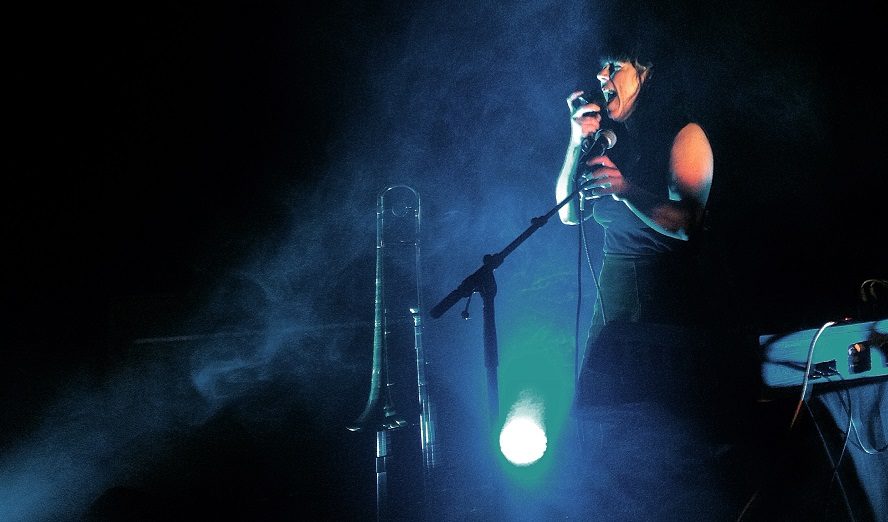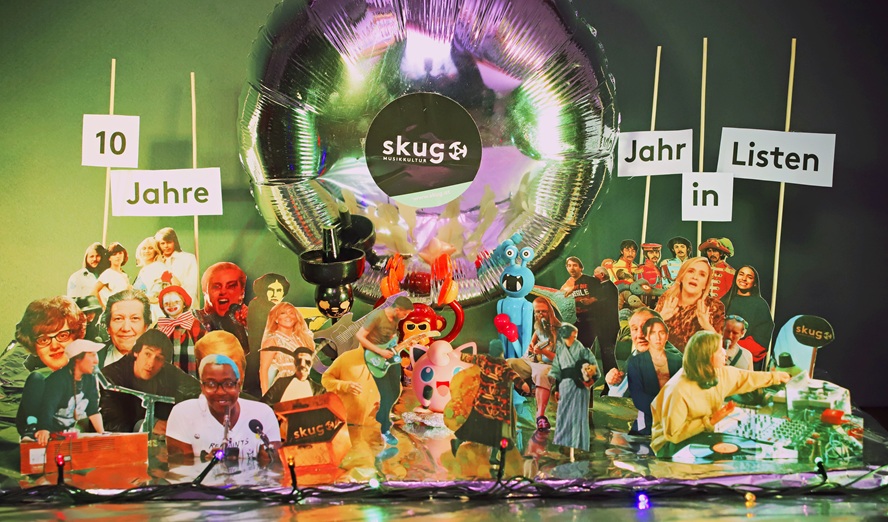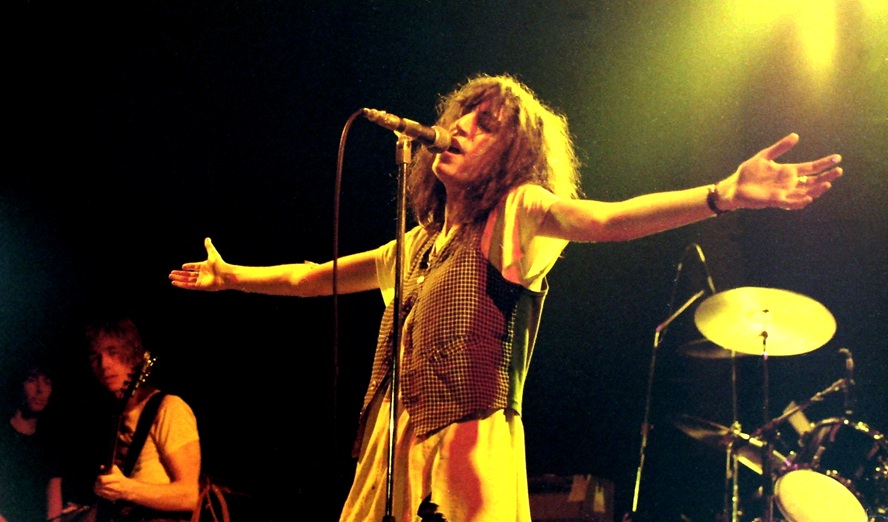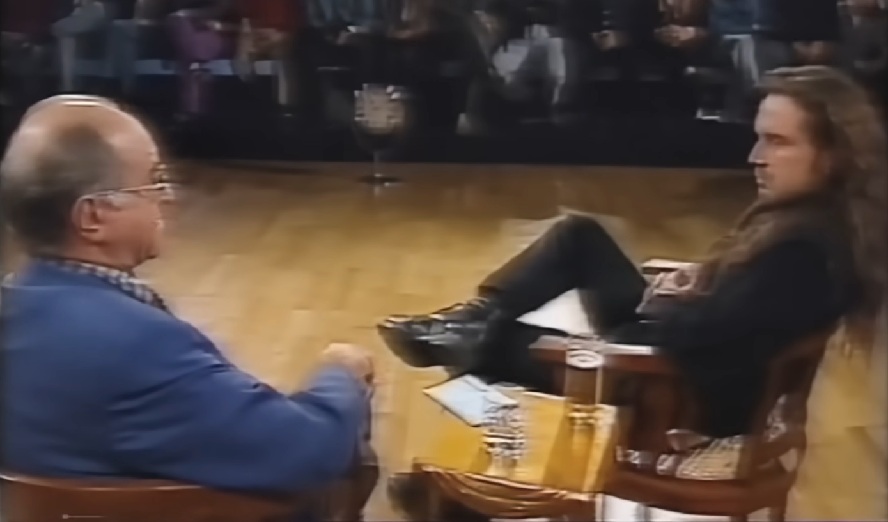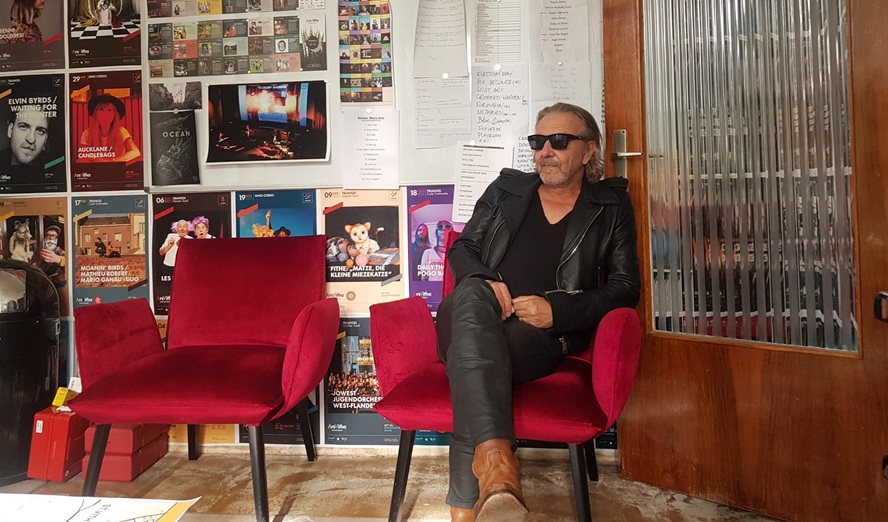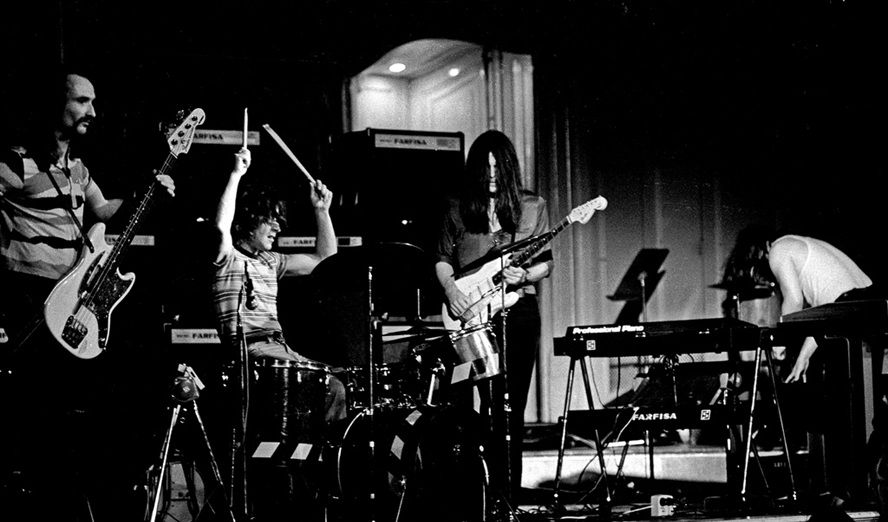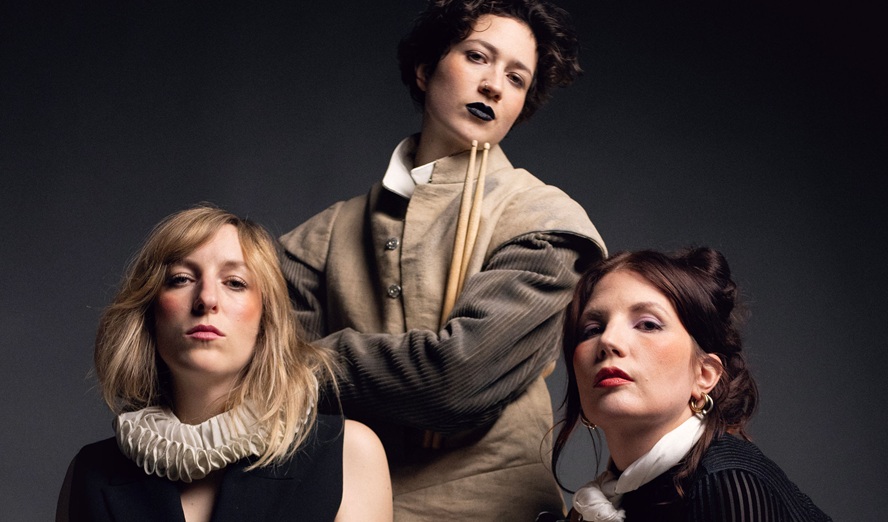This Saturday, we’re introducing two spectacular live acts and an international DJ-line at Salon skug with MAG and Laughing Eye at rhiz Vienna. Beforehand, we took the opportunity to ask Magdalena Ågren aka MAG a couple of questions.
skug: One-girl bands are more rare than one-man bands. Do you perform all your songs by yourself, or are there other musicians on board?
MAG: When I play as MAG, itʼs a one-person project to the extreme. I write and play everything. I had some people helping me with the mixing and mastering when I recorded my album, but otherwise I produced and released it by myself.
Your use of the megaphone gives more power to your sound and looks good, too. It is an old instrument used for political demonstrations. What is your personal approach?
I fell in love with the sound of this megaphone in the middle of the 1990s and have stuck to it since then. It feels like an old friend Iʼm struggling with in some ways but who still makes me happy and creative. You can use it in so many ways. Different kinds of noise and rhythms etc. Itʼs also great for making the live performance more dynamic, for example, if you feel like you want to improvise and leave the stage. The megaphone is also a powerful symbol of political action. Itʼs kind of funny that when you use it, it is almost impossible to hear what you are trying to say. So itʼs like a contradiction to what you are trying to achieve. It feels like thatʼs how a lot of things work today. People screaming louder and louder, but few people can hear whatʼs actually being said or know how to listen. Itʼs frustrating, but screaming into megaphones is good for getting rid of frustrations. Everyone should have one.
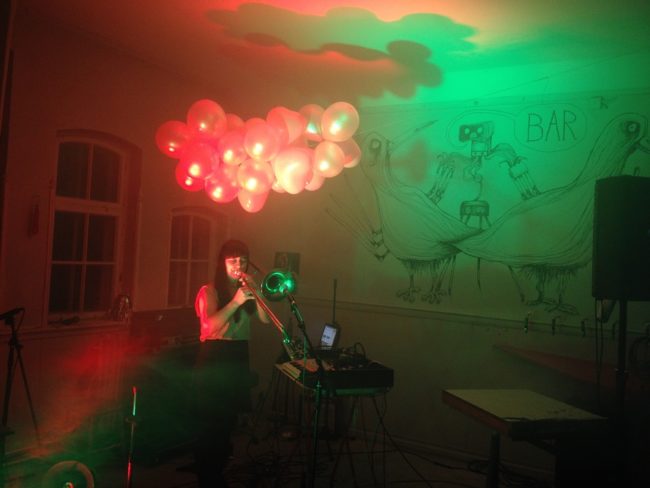
The next questions are about your music, about some fabulous tracks. First, »Inside Mess«, played live 2017 at Sonic City curated by Thurston Moore. Nice melody, sequencing rhythm line. What are the lyrics about?
It’s about love that could have happened but never did.
The live video for »Fun, Fun, Fun«, shot at the Push Festival, shows two people outside sticking small paper sheets on each other’s jackets and heads. And at the end Dracula hands are leaving bloody traces on a body.
The show took place at a festival in Gävle in an old factory building that once held gas. All the credits for the video go to Raquel Meyers, an amazing artist, who was the VJ for this evening. She had never heard me before and the video was her response to my music.
Listening to »Fun, Fun, Fun«: Could this be a cover version of the Beach Boys? It sounds rougher than The Stooges, who had the song »No Fun«. Really sounds like Trombone Riot ’n’ Roll with a fantastic noisy loop. What are the lyrics really about?
It’s not meant to be a cover but who knows where the inspiration came from. I donʼt really know which Beach Boys song you are talking about. Would be nice to hear. The lyrics are kind of ironic, about having fun no matter whatʼs going on in the world. There’s this pressure to be happy and have fun, and there are common rules for how to do it. You are not supposed to break these rules and have fun in your own way.
»Monster« has a seductive voice, sounds more like a ballad. Are you singing about a sweet monster?
The song is about drug addiction. But you are right, just like drugs the monsters are very sweet in the beginning to get you hooked. Just to be able to take everything from you, make you psychotic, and kill you in the end. I have lost some really dear friends to this monster.
To me, »Riot On Your Own« stands for many of your songs which somehow have this Riot Girl rock feeling. Seems to be an important influence?
It’s hard to say where my influences come from since I have been listening to so many different kinds of music all my life. I come from a punk background and the DIY scene. I have listened a lot to Can, Kraftwerk, Laurie Anderson, Patti Smith, PJ Harvey, Philemon Arthur and the Dung, Siouxsie and the Banshees, etc. Iʼve been around so long that I think I had a specific style of music a long time before the Riot Girl movement became a thing. At first my band at the time was described as a girl band. A couple of years later it was described as Riot Girl music. But this was never anything we ever called ourselves or tried to be. It was inspiring at the time that suddenly more women were appearing in the music scene. But I was not really part of some kind of Riot Girl movement, other than that we shared stages with other women sometimes. Personally, I have no interest at all in labeling my music based on my gender. I make music, not woman or girl music, and I donʼt think my music is Riot Girl. But very often I have this feeling that people want to put everything women do into the same box, categorize it that way and not based on the music itself. Just because it somehow seems important for them to separate it from what male musicians do.
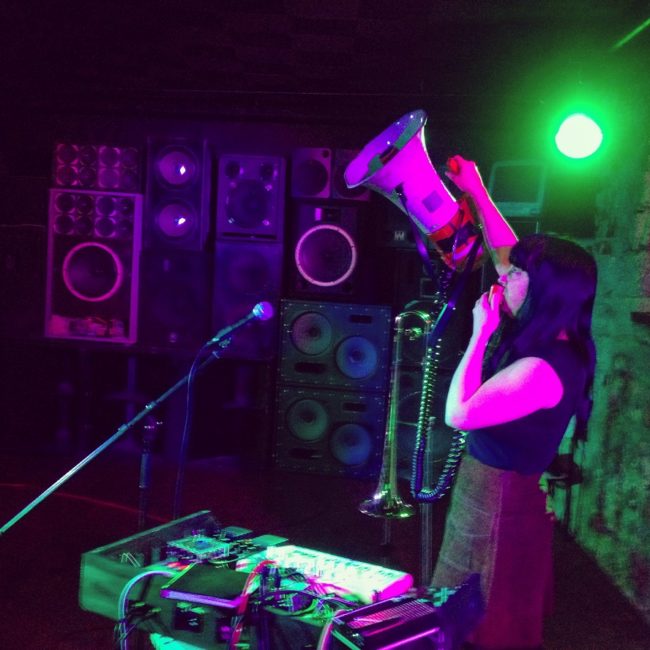
Some songs I found in the interview article »MAG: En megafon i larmet«. And »Trapped on a Loop« is also from the »Echo/Joinus« EP. Are you playing for cows? Great stuff with some nice echoing trombone loops. There’s something hypnotic about it. Is there a field recording part in it?
This music with my duo Trapped in a Loop was recorded in the countryside, so all the cows came running when I would practice my trombone. Seems like cows love the trombone. We thought that it could be a good cover for the EP. Unfortunately, they were not that interested in the guitar, so only one of them stayed for that performance.
SORK’s »Kick on Your Borders« is quite impressive as well. With whom do you collaborate? Or is that your hypnotic post-wave solo project? What are the lyrics about?
SORK is my other band. It’s with Helena Engarås on bass, Pontus Torstensson on drums, and Petrus Fredestad on the organ. It’s about pushing your limits by breaking through barriers and things that are holding you down to get free.
MAG’s live video »You Shouldn’t Done That« seems to be an early work with guitar and somehow manipulated voice. Did you start like that? More as a post–punk songwriter?
I have never really been a guitarist, but when I started to do solo stuff as MAG, I had some ideas that I thought would sound good with guitar, so I had to learn how to play the guitar on those songs. But trombone has always been the main instrument when it comes to my solo project MAG.
More Songs are on the album »Magnitude«. »10,000 Years«, for example, has a catchy sing-a-long line, as many of your songs do. Reminds me again of Riot Girlism. Did something like that exist in Sweden or have we overlooked it in Austria? Because of too many male Swedish rock bands or jazz artists?
Yes, too many male rock bands. The Riot Girl movement existed in Sweden, but maybe not as big as in the USA. But it definitely played a part in giving more women the chance to get into the music scene. Unfortunately, it’s still not equal when you count the male musicians you can watch on the stage in comparison to the female musicians. But nowadays there is much more awareness about this problem. There are so many really good bands with female musicians around, so there is no reason why the stages have to give the space to boring »male« bands. I guess itʼs because most promoters are still men who first of all listen to other men.
Please describe the music scene in your hometown Gothenburg! And how are you participating?
Gothenburg has been a city with many underground clubs and many different live scenes, but at the moment many of them are in trouble or have had to shut down because the police suddenly decided to be harder when it comes to making sure the alcohol law is followed. The complicated systems we have in Sweden to receive an alcohol permit makes it almost impossible for smaller cultural events to legally sell alcohol. Until recently, the police have not made it their priority to shut down these illegal cultural events and music venues, but that has changed now, and it has killed a lot of the scene where I used to be more involved. Despite this, there are still good things around. Like Koloni, which is still around and is the most important and interesting music community for me. Koloni is a music club that moves around to different locations and collects all kind of different music from all over the world. Itʼs very inspiring and attracts an audience of lots of wonderful open-minded people, which usually brings a good vibe to the evening. I used to be more active in Koloni and to help out with different things, but now I don’t really have time for that, so I mostly go and hang out.
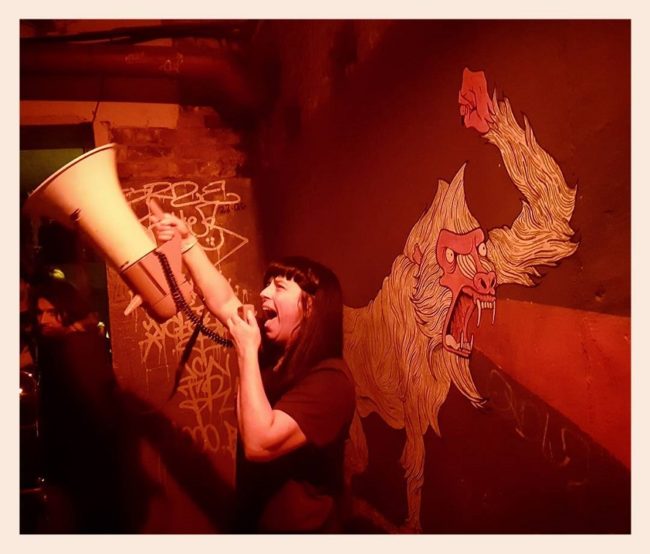
Could you imagine improvising live with Austrian musicians, e. g. with E-violinist Mia Zabelka?
Mia Zabelka seems cool and is an amazing musician so it could be fun. Just as long as she is aware that Iʼm a punk trombonist who has absolutely no professional training.
As in Austria, right-wing politicians and parties are also getting stronger in Sweden. Do you think there is a danger that after the next Swedish elections the Sweden Democrats could be so strong that no other coalition will be able to keep the SD away from power?
Yes, I’m very afraid of this fascist movement that is growing everywhere in the world today. That the Sweden Democrats have become so big is scary as hell. If they win the election, I will not feel safe in Sweden anymore. But these are discussions too big to get into right now, since Iʼm trying to answer these questions from my cell phone while on tour.
Finally, in your own words, what can we expect from Laughing Eye and DJ Christian Pallin when they join you at rhiz to play Salon skug on March 9?
Laughing Eye will take you to another world, strange and beautiful with flavors from an old forest and bizarre monsters. DJ Christian Pallin (the creator of the club Koloni) will bring the good vibe to the evening. He chooses music you’ve never heard before. It will be a wild mix of different kinds of styles from all over the world, but that usually makes people playful and happy.
Link: https://magagren.com/
